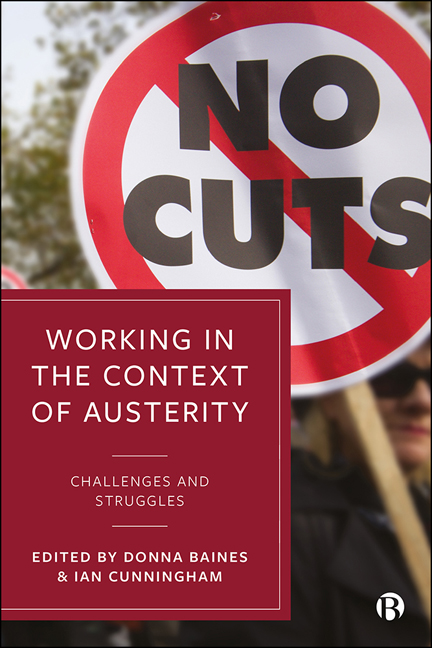14 - Moral Projects and Compromise Resistance: Resisting Uncaring in Non-Profit Care Work
Published online by Cambridge University Press: 18 March 2021
Summary
Debates about workplace resistance and dissent are a central aspect of Labour Process Theory (Burawoy, 1979; Thompson, 1997; Thompson and Smith, 2017). This chapter focuses on care work in the non-profit social services (NPSS), and argues that resistance in this sector is a series of compromises and moral projects. With the objective of extending Labour Process Theory and commenting on resistance in the context of austerity, this chapter draws on qualitative data and on Ackroyd and Thompson's (1999; 2013) three-part analytic frame (described in more detail later) exploring the dynamics of resistance and dissent in care work.
The NPSS is funded largely by government and grew dramatically under welfare state contracting out (Cunningham, 2008; Eikenberry, 2009). It provides support and care services to a range of populations such as the elderly, young, people with disabilities and people with mental health issues. Agencies come in a variety of sizes, from very small (one or two employees) to very large (1,000+ workers), and some operate as regional or national non-profit chains.
Mirroring the contradictory relations of the austerity-linked, contracted-out state that funds most non-profit care in Canada, workplace resistance and dissent in the NPSS is an unstable equilibrium that can legitimize austerity, act as a catalyst to undermine it, or both. NPSS staff members often have altruistic/social justice identities outside of the workplace, and they seek these values in the organization's mission, work content and workplace relationships. Workers’ personal values often form the bedrock on which oppositional identities and practices are built, enhanced, frustrated and circumscribed, or a combination of all these factors simultaneously (Van Til, 2009; Nickel and Eikenberry, 2016). Most workers assume that altruistic values and identities will be held in common by fellow employees and managers, and seek ways to bond with others in the workplace around this presumed shared identity. In addition, they often educate and mobilize each other around ongoing political and social understandings of social justice and care (Aronson and Smith, 2010; 2011). This shared, oppositional analysis can extend beyond the workplace to analyses of the larger society and the ways that unjust relations are seen to be active in the workplace.
- Type
- Chapter
- Information
- Working in the Context of AusterityChallenges and Struggles, pp. 279 - 300Publisher: Bristol University PressPrint publication year: 2020



